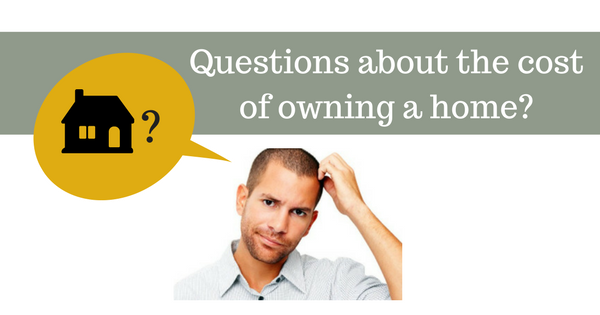
Team Lead, Noel Geremia breaks down the costs of owning a home.
1. One Time Costs:
The Deposit:
This cost counts towards your overall down payment on the property. Usually proportionate to the size of the down payment / price of the property you are offering on. For example, if you are looking to put 5%, 10%, or 20% down, your deposit amount would be 1/4, 1/2, 3/4, or more of that overall down payment. The deposit holds the property while you perform your inspections and due diligence before “locking in” your purchase contract. This money must be brought in at the time the offer is written and (when using a REALTOR®) will be held in trust until we know if the inspections and approvals have been passed to your satisfaction or not.
Down Payment:
The down payment is another cost that you need to have available up front. However, you will keep this money in your own bank account until the end of the transaction. The size of your down payment will depend on a few factors: the price of the property you are offering on, the occupancy type and your individual financing arrangements. For example, in an owner-occupied property, the minimum down payment will be 5% of the purchase price of the property, but requires you to also pay default insurance fees. On the same property, a minimum down payment of 20% is required to waive the requirement to pay the default insurance fees. On a tenant-occupied property, the minimum down payment will be 20%. In the transaction, your down payment goes directly towards the purchase price of the property and therefore becomes your “equity” in the property.
Closing & Inspection Costs:
These costs, as a Buyer are expected to paid out of pocket after the offer has been made and prior to you moving into the property. If you’re planning to purchase a home with the help of a mortgage, your bank or mortgage broker will want to see that you have cash available to cover these costs as part of your pre-approval/approval process. Typically you can budget 1% to 2% of the purchase price of the property (in addition to the down payment) to cover these costs. Typical things that make up these costs include: inspections, appraisals (bank and legal fees), title insurance (if no surveyor certificate is on file), title transfer & registrations fees (needed to put the property into your name), and an insurance certificate. Depending on the property type and other specialty circumstances that may show up in the transaction, there may be additional fees. This is an area Your REALTOR® can give you extra guidance on.
2. Regular On-Going Costs:
Mortgage payments:
Both principal & interest and is dependent on the purchase price of the property, the rate you get from the lender on your financing, and the size of your down payment.
Property taxes:
Usually billed annually, but in some cases can be put on a monthly payment plan.
Property Insurance:
Typically renewed annually, but costs would depend on your insurance claim history / the provider you buy from. If budgeted wisely you can expect $80 to $100 per month for an owner-occupied home.
Utilities:
Includes heat, water, sewer, electricity, telephone, internet, garbage pick-up, recycling pick-up, and etc.
Maintenance:
This is a cost that I find most people do not budget for at all. Best practice would be to plan to invest 1% to 2% of the value of your property back into it each year for repairs, maintenance, and updates. This helps protect your re-sale value over time.
Commuting:
Map out your most frequented destinations from the GPS pin on the listing and compare it to the amount of KM you get per tank on your car to get a realistic picture of what commuting costs would look like for you.
3. Moving Costs:
Includes any cost incurred to get you and your personal possessions moved from point A to point B. These would be things like: booking a moving truck or trailer, getting moving boxes and packing supplies, hiring movers, fuel for vehicles traveling from point A to point B, meals for volunteers / helpers, and costs for moving out of your old place (clean up, repairs, cancelling leases & dealing with security deposits, etc.).
If you have any more questions in regards to the costs of owning a home, contact Brittney Houde or Noel Geremia.



